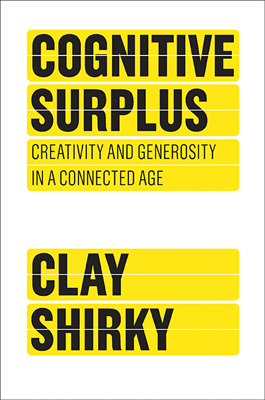 I love the title of Clay Shirky‘s new book: Cognitive Surplus: Creativity and Generosity in a Connected Age. What a marvelous phrase, cognitive surplus. It suggests that there is a basic reservoir of cognitive ability in all of us. And now, in our hyperconnected age fueled by social media, there is a surplus.
I love the title of Clay Shirky‘s new book: Cognitive Surplus: Creativity and Generosity in a Connected Age. What a marvelous phrase, cognitive surplus. It suggests that there is a basic reservoir of cognitive ability in all of us. And now, in our hyperconnected age fueled by social media, there is a surplus.
Interestingly, however, while the digerati prattle away on blogs, Twitter and Facebook, it turns out that more than half of Americans (52 percent) are NOT frequent users of the Internet. That’s the flip side of the oft-quoted statistic that 48 percent of Americans now use the Internet more than one hour a day. If you follow my math, it turns out that the majority of Americans are probably not hyperconnected, perhaps not creative (at least digitally) and possibly not generous either.
And we’re not just talking TV-watching couch potatoes here. I have a surprising number of friends (and a few family) in the 40 to 80-year-old range who are adamantly opposed to participating in social networks or using social media. Why? No reason. A knee-jerk “just don’t want to.”
That’s the flaw in this otherwise provocative book.
Reviewer Jason Falls also questions the basic premise, that our cognitive surplus will prompt us to come together to collaborate and solve serious societal problems. As Jason puts it: “his (Shirky’s) possibility world of Kumbaya-building Utopia is a stretch.”
Still, I found much to like in Clay’s book: he is both artful and clear with his examples of successful collaborations to date, from Wikipedia (which, despite its success, has sucked up only one percent of the man hours we typically spend annually watching TV) to Napster to Ushahidi (which evolved into a platform that reports acts of violence and other crises in real-time).
Clay looks at music-sharing service Napster in the context of collaboration and then explains: “Young people using Napster weren’t inherently more community-minded; they simply wanted music for free.” In other words, it’s not the tools themselves, it’s what we choose to do with them. And the less friction – the easier it is to use the tools – the more likely it is that millions of people will collaborate and create something (a phenomenon) that we didn’t foresee. Twitter is a perfect example.
Shirky’s academic background often shows through in his writing. He points out that the word amateur comes from the Latin amare (to love). The point is that amateurs do what they do out of passion and because they love it. Not because they are paid to do it. That dovetails with his riff on intrinsic vs. extrinsic motivation – a key concept if you embrace the idea that our cognitive surplus will enable us to create great things together. Side note: I believe Dan Pink uses the same example of an experiment that involves putting a puzzle together to explain intrinsic vs. extrinsic in his new book, Drive.
The last chapter, Looking for the Mouse, is where the rubber meats the road as far as Shirky’s thesis goes. He is at his most appealingly transparent here, admitting:
What matters most now is our imaginations. The opportunity before us… is enormous; what we do with it will be determined largely by how well we are able to imagine and reward public creativity, participation and sharing.
– Chapter 7, page 212: Cognitive Surplus
In other words, it’s still a maybe. There are no guarantees of public good occurring despite the gigantic cognitive surplus we are enjoying and which social media tools are enabling. Shirky also shares a list of his lessons learned (pages 193 – 207) “to improve odds for successfully harnessing cognitive surplus.”
Among his tips that resonated with me:
– Start Small (no matter how big you plan to grow your service, it needs to work just as well when it’s small.)
– Ask “Why” (put yourself in the shoes of your user – and be skeptical.)
– Support a Supporting Culture (he uses the Quiet Car on the Amtrak train as an example; when someone talks on his phone, other passengers immediately shush him. And yes it’s almost always a man breaking the Quiet Car rules.)
– Adapting (throw something out there and see how people use it; it may surprise you. Again, Twitter.)
– Try Anything, Try Everything (in other words, experiment. THIS IS KEY.)
Finally, thanks to TLCBooktours for sending me a review copy of Cognitive Surplus and for including me in the list of distinguished reviewers participating in Shirky’s blog tour. A blog tour in and of itself is an example of the kind of “creativity and generosity” that Shirky so gracefully articulates in his book.
